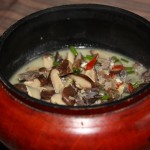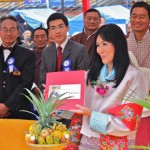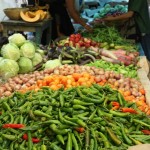This summer, Core student Erik Nagamatsu (Core ’11, CAS ‘13) released Foods of the Kingdom of Bhutan. This book, which Erik co-authored with his father, is the first cookbook ever devoted to the cuisine the Himalayan kingdom of Bhutan. Core student employees John McCargar and Tom Farndon sat down with Erik to talk about the creative process that led to this handsome book.
 What inspired you to write the cookbook?
What inspired you to write the cookbook?
I should probably explain how I got involved with Bhutan in the first place. I took my first trip there in 2007, volunteering with the Tarayana Foundation, a non-profit organization that focuses on supporting and improving the economic condition of rural communities in Bhutan. I spent some time at the office in the capital, Thimphu, and visited a few of their project sites. One of them didn’t have any running water or electricity—they were building houses for them. After that trip, I wanted to go back and help in a greater capacity. I can donate my time, but I wanted to do something more significant. My dad and I have always been interested in traveling and food. We noticed there weren’t yet any cookbooks on Bhutanese food. It’s quite a unique cuisine; you only find it in Bhutan. So we decided to make a cookbook and donate all the proceeds to the charity. That was how we came up with the idea. After that, I went back to Bhutan in 2008 and worked with people who had experience and knowledge in Bhutanese cuisine to take note of the dishes and translate them into a cookbook.
Who did you work with primarily?
A woman named Aum Tshering Doma. She had a restaurant, and was respected within the Bhutanese culinary community.
How successful has the cookbook been?
We launched the book in May at the Tarayana Fair. So far it’s being distributed throughout Bhutan. As for the book’s reception, while there are many books on the Bhutanese environment or its textiles, its cuisine is a relatively new subject, yet to be explored in books — so the reception has been positive.
What makes Bhutanese food unique? Are there peculiarities to Bhutanese cuisine?
Almost every dish has chilies and cheese. That is definitely their distinctive characteristic. The Bhutanese like their food spicy!
Are you thinking of doing a follow-up book or anything of that nature?
Yes! We’ll see how things go in Bhutan and may do a second printing and expand the distribution beyond Bhutan.
Is there anything else about Bhutan you’d like to tell us?
Bhutan is known in particular for its philosophy of Gross National Happiness (GNH), based on the idea that wealth and GDP do not necessarily represent happiness. Rather, the Bhutanese believe that true development involves a careful balance between both the physical and spiritual well-being of each individual GNH is comprised of four pillars: Conservation of the Environment, Equitable and Sustainable Development, Good Governance, and Preservation of Culture. In the area of environmentalism, for example, Bhutan is carbon neutral and currently has more than 70% forest cover. By law, at least 60% of the country must remain under forest cover at all times. For governance, Bhutan became the world’s youngest democracy in 2008, as it made the transition from an absolute monarchy to a constitutional monarchy. Jeffrey Sachs recently visited Bhutan and shared his views in this article which discusses GNH in greater depth.

Click the image above to see a recipe for Norsha Shamu Tshoem, a curry dish of yak (or beef) and mushrooms.
More information…
- article about the launch of Erik’s cookbook
- The Tarayana Foundation
- The Bhutan Foundation
- Erik adds, in a follow-up email:






